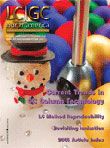Peaks of Interest
Waters Corporation (Milford, Massachusetts) announced its sponsorship of two American Chemical Society Achievement Awards.
Waters sponsors awards
Waters Corporation (Milford, Massachusetts) announced its sponsorship of two American Chemical Society Achievement Awards. The annual awards recognize outstanding accomplishments in the fields of separations science and technology and mass spectrometry.
"It's important for companies like Waters to take an active role in furthering the goals of the American Chemical Society and acknowledging scientific achievement in the separations sciences and mass spectrometry, two very important areas of focus for Waters Corporation," said Art Caputo, president of the Waters Division of Waters Corporation. "And we stand behind the ACS vision to 'improve people's lives through the transforming power of chemistry'."
"Corporate support of the national Awards Program is essential to the American Chemical Society (ACS). The ACS very much appreciates the support of Waters Corporation for the Field & Franklin Award in Mass Spectrometry and for the reinstatement of the Award in Separations Science and Technology," said C. Gordon McCarty, Chair ACS Board Committee on Grants and Awards.
Cerno Bioscience signs agreements
Cerno Bioscience (Danbury, Connecticut) announced two agreements have been reached with research institutes in China for the use of its MS data analysis software, MassWorks. Cerno has entered into collaborative research in drug metabolism with Dafang Zhong, director of Drug Metabolism Research at Shanghai Institute of Materia Media, Chinese Academy of Sciences (Shanghai, China). Cerno also has signed an agreement with Egret Pharma Limited (Shanghai, China) for extensive use of the MassWorks software in small molecule synthesis.
Research by Zhong will focus on obtaining high mass accuracy to aid in metabolite identification using conventional mass spectrometry systems by applying MassWorks.
The agreement with Egret Pharma will see the company using Cerno's MassWorks software extensively in its small molecule synthesis studies to shorten significantly the turnaround time in the drug discovery process.
A Matrix-Matched Semiquantification Method for PFAS in AFFF-Contaminated Soil
Published: April 14th 2025 | Updated: April 14th 2025Catharina Capitain and Melanie Schüßler from the Faculty of Geosciences at the University of Tübingen, Tübingen, Germany describe a novel approach using matrix-matched semiquantification to investigate per- and polyfluoroalkyl substances (PFAS) in contaminated soil.
Silvia Radenkovic on Building Connections in the Scientific Community
April 11th 2025In the second part of our conversation with Silvia Radenkovic, she shares insights into her involvement in scientific organizations and offers advice for young scientists looking to engage more in scientific organizations.












